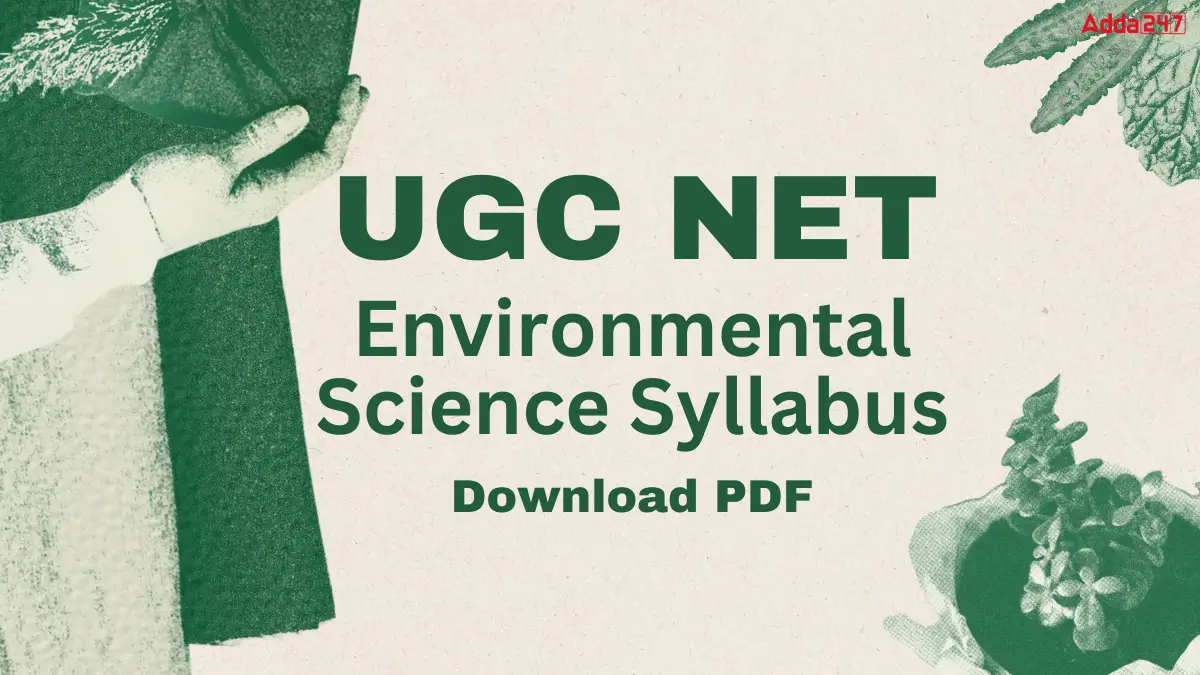Table of Contents
The University Grants Commission National Eligibility Test (UGC NET) for Environmental Science is a significant exam in India. It’s conducted to assess candidates’ eligibility to be appointed as Assistant Professors or to get a Junior Research Fellowship (JRF). If you pass, it means you’re qualified to teach at a university or get a fellowship for research. This test is very important for starting a career in academia. The UGC NET exam is administered by the National Testing Agency (NTA) on behalf of the University Grants Commission (UGC). Here we are providing the UGC NET Environmental Science Syllabus in detail for the NET exam 2025 preparation.
UGC NET Environmental Science Syllabus 2025
The UGC NET Exam 2025 will be conducted by the National Test Agency (NTA) in online mode at a national level. The candidates must refer to the following table for further details on the UGC NET Environmental Science Syllabus 2025.
| UGC NET Environmental Science Syllabus | |
| Name of the Exam | National Eligibility Test (NET) |
| Conducting Body | National Testing Agency (NTA) |
| Exam Conducted in A Year | Twice a Year |
| Mode of Examination | Online |
| Type of Questions | Multiple Choice Questions (MCQs) |
| Number of Papers |
|
| Number of Questions | 150 |
| Time Duration | 3 hours |
| Negative Marking | No |
UGC NET Environmental Science Exam Pattern
The candidates must check out the following table under the UGC NET Environmental Science Exam Pattern in depth.
- Mode of Exam: Online
- Duration: 3 hours (180 minutes)
- Number of Papers: The exam consists of two papers – Paper I and Paper II.
- Paper I: It is a common paper for all subjects and tests the teaching and research aptitude of the candidates. It consists of 50 objective-type questions, and the total marks are 100.
- Paper II: It is subject-specific and consists of 100 objective-type questions. The total marks for this paper are 200.
- Marking Scheme: Each correct answer carries 2 marks, while there is no negative marking for incorrect answers.
UGC NET Environmental Science Qualifying Marks
The qualifying marks for the UGC NET Environmental Science exam are determined by the University Grants Commission (UGC). The UGC sets the minimum qualifying criteria for both Paper I and Paper II of the UGC NET exam. Here are the qualifying marks criteria for NET:
- Paper I: Candidates need to secure a minimum of 40% aggregate marks in Paper I. This means that out of the total 100 marks, candidates must score at least 40 marks to qualify.
- Paper-II: Candidates need to secure a minimum of 40% aggregate marks in Paper-II as well. The total marks for Paper-II are 200, so candidates must score at least 80 marks to meet the qualifying criteria.
- Aggregate Qualifying Marks: In addition to the individual qualifying marks in Paper I and Paper II, candidates need to obtain an overall aggregate score to qualify for UGC NET. The aggregate score is calculated by combining the marks obtained in both papers. The aggregate qualifying marks for the General category candidates is 40% (i.e., 40% of the total marks of Paper-I and Paper-II). For candidates belonging to reserved categories (SC/ST/OBC-NCL/PwD), the aggregate qualifying marks are reduced to 35%.
UGC NET Environmental Science Syllabus PDF Section-wise
The detailed section-wise UGC NET Environmental Science Syllabus has been mentioned below:
| Unit | Syllabus |
| Unit I: Fundamentals of Environmental Sciences |
|
| Unit-II: Environmental Chemistry |
|
| Unit III: Environmental Biology |
|
| Unit IV: Environmental Geosciences |
|
| Unit V: Energy and Environment |
|
| Unit-VI: Environmental Pollution and Control |
|
| Unit-VII: Solid and Hazardous Waste Management |
|
| Unit-VIII: Environmental Assessment, Management and Legislation |
|
| Unit-IX: Statistical Approaches and Modelling in Environmental Sciences |
|
| Unit-X: Contemporary Environmental Issues |
|
Download UGC NET Environmental Science Syllabus PDF
The UGC NET Syllabus for the Environmental Science Subject PDF is given below. The candidates must click on the following link to access the NTA NET Environmental Science Syllabus PDF. The candidate can click on the direct link to download the NET Environmental Science Syllabus PDF by clicking on the links below.
UGC NET Environmental Science Syllabus PDF
Preparation Tips to Crack UGC NET Environmental Science Exam
- Understand the Exam Pattern: Familiarize yourself with the exam pattern, syllabus, and marking scheme to plan your preparation accordingly.
- Create a Study Plan: Divide your time effectively for each topic and allocate more time to areas that require more attention.
- Study Material: Refer to standard textbooks and study materials recommended for the UGC NET Environmental Science exam.
- Solve Previous Year Question Papers: Practice solving previous year question papers and sample papers to get acquainted with the exam pattern and improve time management skills.
- Mock Tests: Take online mock tests to assess your preparation level and identify areas of improvement.
- Stay Updated: Keep yourself updated with the latest developments and current affairs related to environmental science.
- Revision: Regularly revise the topics you have studied to retain the information effectively.
- Time Management: Practice solving questions within the stipulated time to enhance your speed and accuracy.




 CTET Paper 2 Syllabus and Exam Pattern 2...
CTET Paper 2 Syllabus and Exam Pattern 2...
 OSSTET Syllabus 2026, Check Exam Pattern...
OSSTET Syllabus 2026, Check Exam Pattern...
 HTET Syllabus 2026 (PRT, TGT, PGT), Chec...
HTET Syllabus 2026 (PRT, TGT, PGT), Chec...












